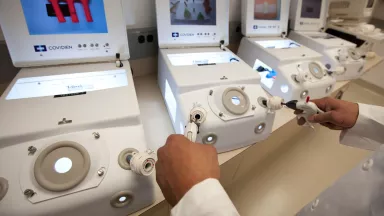Introduction
Our world-renowned orthopedic surgeons and orthopedists are experts in their fields with specialized training to provide the optimal diagnosis and treatment for a range of orthopedic conditions. We are internationally recognized for delivering the highest-quality orthopedic care to our patients.
What is Morton’s neuroma?
Morton’s neuroma is a swollen or thickened nerve in the ball of the foot.
What causes it?
When toes are squeezed together too often and for too long, the nerve that runs between the toes can swell and get thicker. This swelling and thickening can make it painful to walk on that foot. High-heeled, tight or narrow shoes can worsen the pain. Sometimes, changing to shoes that give toes more room can help.
What are the symptoms?
Morton’s neuroma can cause a very painful burning or sharp pain in the foot that feels worse when walking. It may feel like a small lump inside the ball of the foot. It usually occurs between the third and fourth toes, but it can also be between other toes.
How is it diagnosed?
Your doctor can usually identify Morton’s neuroma during a physical exam by squeezing or pressing on the bottom of the foot or squeezing the toes together to see if that hurts. The doctor may also order an X-ray of the foot to make sure nothing else is causing the pain.
How is it treated?
Morton’s neuroma can often be treated at home with a few simple steps:
- Avoid wearing tight, pointy or high-heeled shoes; choose well-fitted shoes with plenty of room for toes.
- Put ice or a cold pack on the area for 10 to 15 minutes at a time; keep a thin cloth between the ice and skin.
- To reduce pain and swelling, take anti-inflammatory medicines such as ibuprofen or naproxen.
- Reduce activities that put pressure on the toes, such as racquet sports or running.
- Massage the foot to relax the muscles around the nerve.
- Rest the feet whenever possible.
If these steps do not relieve symptoms, your doctor may suggest special pads or devices that spread the toes to keep them from squeezing the nerve. In some cases, your doctor may administer a steroid shot to reduce swelling and pain. If these treatments do not help, your doctor may suggest surgery.
Physician Referrals
Montefiore Einstein embraces a collaborative approach.
If you have a patient who could benefit from our services, please reach out.
718-920-2060
Schedule a Visit
Have a general question or concern?
We’re available to help you by phone or email.
• 718-920-2060 • orthofeedback@montefiore.org






